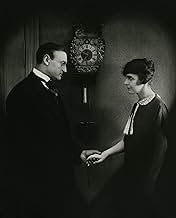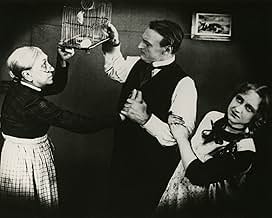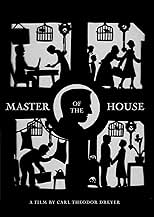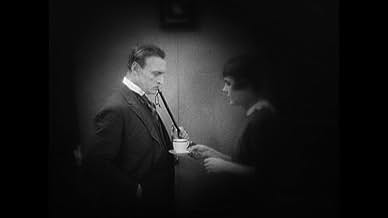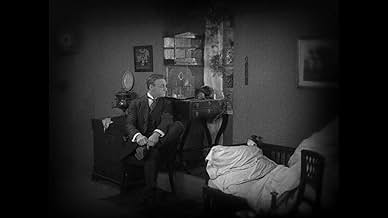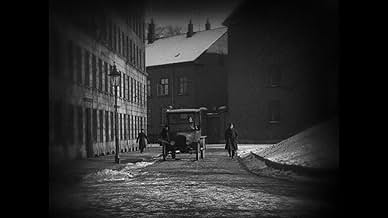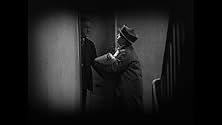IMDb RATING
7.0/10
2.6K
YOUR RATING
When a man becomes tyrannical towards his family, the women of the house decide to teach him a lesson in gratitude.When a man becomes tyrannical towards his family, the women of the house decide to teach him a lesson in gratitude.When a man becomes tyrannical towards his family, the women of the house decide to teach him a lesson in gratitude.
Featured reviews
Victor Frandsen is a domestic tyrant. His wife Ida has to work as a slave for him and the rest of the family. She rises early to prepare everything for the day, she toils all day long, and she is often up also in the night, doing some sewing to earn extra money for the household.
Dreyer is one of the greats in silent cinema, both in his homeland and internationally. His greatest achievement is probably "Joan of Arc" and many have appreciated "Vampyr". This film came a few years earlier, but is every bit as good in its own way (and with its release on Criterion, it has never looked better).
The Danes are not typically known for their role in cinema history, but Dreyer was an undeniable force in the 1920s If nothing else, he inspired Bergman, who was probably the greatest Scandinavian director of all time.
Dreyer is one of the greats in silent cinema, both in his homeland and internationally. His greatest achievement is probably "Joan of Arc" and many have appreciated "Vampyr". This film came a few years earlier, but is every bit as good in its own way (and with its release on Criterion, it has never looked better).
The Danes are not typically known for their role in cinema history, but Dreyer was an undeniable force in the 1920s If nothing else, he inspired Bergman, who was probably the greatest Scandinavian director of all time.
The story of a "spoilt husband" - selfish, irritable, very ill-tempered and demanding as he rules the house, while his patient/devoted wife gets up at the crack of dawn to start her drab day of tending to his constant needs and complaints. Even the kids have to perform tasks all day rather than play to satisfy their tyrant of a father - but he's NEVER satisfied, nothing seems to be to his liking! Yeah, you got it, this guy is a serious jerk leaving me to wonder why the wife hasn't left him long ago. Luckily smart Nana, hubby's childhood nursemaid, steps up to the plate to help make some changes as she fetches the wife's mother and the two old women set out to straighten this guy out and teach him the lesson he so badly needs - to appreciate his wife. So the wife goes away for a "rest" (well needed, I should say) leaving hard-nosed Nana in charge of the brute!
This film is adequately entertaining, it is photographed in an interesting way, but is somewhat slow-moving and drags a bit in places. I would say at least half an hour shorter would have made this a better film. The acting is quite well done by all players. The version as shown on TCM included a pleasant piano score that sometimes suits the plot - and sometimes doesn't. Worth seeing.
This film is adequately entertaining, it is photographed in an interesting way, but is somewhat slow-moving and drags a bit in places. I would say at least half an hour shorter would have made this a better film. The acting is quite well done by all players. The version as shown on TCM included a pleasant piano score that sometimes suits the plot - and sometimes doesn't. Worth seeing.
After seeing this movie (along with many other Dreyer's movies) I still wonder why people think that this Danish director is kind of boring.
This is perfect example of what Dreyer's cinematography is and what is not. This is a film where you can find some gentle spirit lying beneath. Some sort of quietness that fulfils the whole movie. As in many other of his early movies, Dreyer puts the spectator in a superior level. We are given the opportunity to watch an everyday's scene: a woman subjugated to a spoilt man's will. We watch her wake up early in the morning, wash dishes, clean the whole house, prepare her husband's breakfast and all she gets in exchange is bad manners and retreats from him. The complot that the nanny builds up to make the man feel guilty and so, to make him behave, unfolds in a subtle and sometimes funny way, making the watching more enjoyable from the distance.
It's hard to describe the perfect acting that the main characters bring to this beautiful film; an acting full of details and emotion.
Enjoyable form the first frame to the last one, this film will work perfectly for Dreyer's fans as long as for those who ever thought this was a tough one. It's, probably, the perfect bridge to approach to Dreyer's masterpieces such as "Ordet" and "Gertrud".
Hope you like it as much as I did.
This is perfect example of what Dreyer's cinematography is and what is not. This is a film where you can find some gentle spirit lying beneath. Some sort of quietness that fulfils the whole movie. As in many other of his early movies, Dreyer puts the spectator in a superior level. We are given the opportunity to watch an everyday's scene: a woman subjugated to a spoilt man's will. We watch her wake up early in the morning, wash dishes, clean the whole house, prepare her husband's breakfast and all she gets in exchange is bad manners and retreats from him. The complot that the nanny builds up to make the man feel guilty and so, to make him behave, unfolds in a subtle and sometimes funny way, making the watching more enjoyable from the distance.
It's hard to describe the perfect acting that the main characters bring to this beautiful film; an acting full of details and emotion.
Enjoyable form the first frame to the last one, this film will work perfectly for Dreyer's fans as long as for those who ever thought this was a tough one. It's, probably, the perfect bridge to approach to Dreyer's masterpieces such as "Ordet" and "Gertrud".
Hope you like it as much as I did.
Du Skal ære Din Hustru / Master of the House (1925) :
Brief Review -
One of the earliest films to break the silence on the domestic tyranny of husbands over housewives. A commandment for all men: "Thou Shalt Honour Thy Wife." I never really imagined an unorthodox filmmaker like Carl Theodor Dreyer making such a simple film with a sweet message. So Master of the House was like a notion breaker for me, and it also made me realise the fact that Dreyer was a master of all genres and various topics, that too in different cinema industries. This was a Danish film - a cinema industry that wasn't fully exposed to the pathbreaking cinema at that time. Yet, Carl brought them a pathbreaking topic without going beyond mainstream theories of society. Now this one is deeper and closer than it appears because it takes you inside a house. The film shows you the happenings we all see in every alternate family and almost every next couple. We all witness such things even today, almost a century later. So you can imagine the power and importance of this concept brought to light by Carl Theodor Dreyer. It was one of the earliest films to break the silence on domestic violence, verbal abuse, ill-treatment, and humiliation faced by common housewives. I am a man, but I felt for her, and I hated the man here, and I also liked the change in his behavior. That was predictable, though, and still extremely lovable. When a man loses his job, he becomes tyrannical towards his family and the women of the house. A nanny and mother-in-law decide to teach him a lesson in gratitude, or to the entire fraternity of male dominance for that matter. Astrid Holm makes a housewife that you'll love to have in your life, while Mathilde Nielsen's portrayal wins your heart. Carl Theodor Dreyer's film is sweet, simple and beautiful, but most importantly, it teaches all men to honour their wives, who tirelessly rub the house 27x7 for them.
RATING - 7.5/10*
By - #samthebestest.
One of the earliest films to break the silence on the domestic tyranny of husbands over housewives. A commandment for all men: "Thou Shalt Honour Thy Wife." I never really imagined an unorthodox filmmaker like Carl Theodor Dreyer making such a simple film with a sweet message. So Master of the House was like a notion breaker for me, and it also made me realise the fact that Dreyer was a master of all genres and various topics, that too in different cinema industries. This was a Danish film - a cinema industry that wasn't fully exposed to the pathbreaking cinema at that time. Yet, Carl brought them a pathbreaking topic without going beyond mainstream theories of society. Now this one is deeper and closer than it appears because it takes you inside a house. The film shows you the happenings we all see in every alternate family and almost every next couple. We all witness such things even today, almost a century later. So you can imagine the power and importance of this concept brought to light by Carl Theodor Dreyer. It was one of the earliest films to break the silence on domestic violence, verbal abuse, ill-treatment, and humiliation faced by common housewives. I am a man, but I felt for her, and I hated the man here, and I also liked the change in his behavior. That was predictable, though, and still extremely lovable. When a man loses his job, he becomes tyrannical towards his family and the women of the house. A nanny and mother-in-law decide to teach him a lesson in gratitude, or to the entire fraternity of male dominance for that matter. Astrid Holm makes a housewife that you'll love to have in your life, while Mathilde Nielsen's portrayal wins your heart. Carl Theodor Dreyer's film is sweet, simple and beautiful, but most importantly, it teaches all men to honour their wives, who tirelessly rub the house 27x7 for them.
RATING - 7.5/10*
By - #samthebestest.
Exceptional because 90% of the story is set in an apartment but does not bore the viewer.The main credit to the movie should go to the writers.Although the story is mainly serious many of the lines show well thought out humor.It's already been brought out how the film is a step back in time showing how a typical Danish family might of went about doing daily chores in that era.At times it has the look of being filmed for future generations to study.Seeing a person carrying a tub of clothes up a few flights of stairs can generate a lot of appreciation for a clothes dryer.The few outdoor scenes were of interest also as they reflected a lifestyle of the past.Yes the story is of a a bad husband/father mistreating the family.To add to his fearful image he seems to be a huge man.This may be best noted in a closeup scene of his hand and the oldest daughter's hand together,the difference in size is great.The emphasis on his being a tyrant is great also but quite believable.The wife's slave like existence is laid on thick and is not quite so believable.The doubt here being brought about by her total lack of verbal response to the husbands unreasonable comments.She just puts her head down and obeys.Her role is almost 100% fairytale like.Compared to her Cinderella might seem sassy.The mentioning of the wife's lack of protest is an observation not an criticism (it's not easy to make that sound right).Anyone with only a slight interest in this subject matter will probably still be entertained by this movie.
Did you know
- TriviaAt its original release in Paris, France, this film played in 57 theaters in three weeks.
- Quotes
Opening Title Card: In the numerous streets of the Big City, house follows house, and in those houses, people live in layers - like wild birds carving their nests into the rock... nest above nest...
- Alternate versionsA 107-minute version with English intertitles and an uncredited piano score was shown on the Turner Classic Movies (TCM) channel in 2006. It had no crew credits other than the director (as Carl Dreyer) and only three cast members: Johannes Meyer (as Johs Meyer), 'Astrid Holm' and Mathilde Nielsen. The English names used were John and Mary for the husband and wife, presumably to indicate a typical family, and "Nana" for the Wetnurse. The two older children were called Kathleen and Dick.
- ConnectionsEdited into Mathilde Nielsen - Kavalkade (1941)
- How long is Master of the House?Powered by Alexa
Details
- Release date
- Country of origin
- Language
- Also known as
- Mannen och hans överman
- Production company
- See more company credits at IMDbPro
- Runtime
- 1h 51m(111 min)
- Sound mix
- Aspect ratio
- 1.33 : 1
Contribute to this page
Suggest an edit or add missing content

